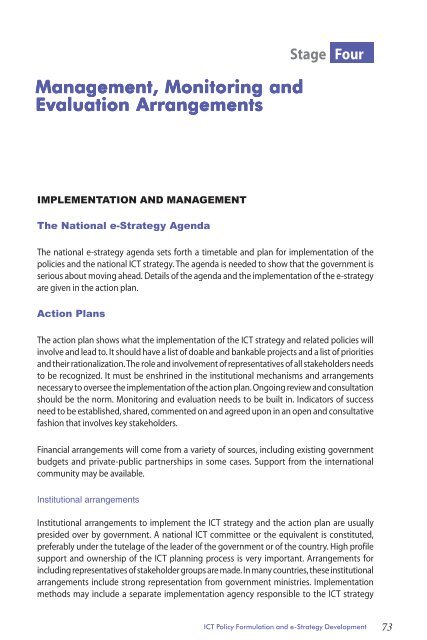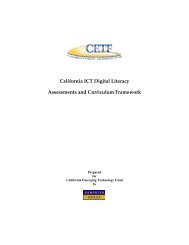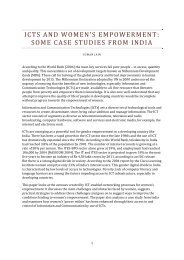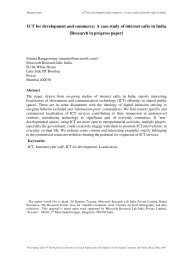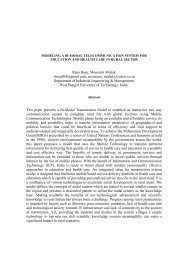ICT Policy Formulation and e-Strategy Development: A ... - un-apcict
ICT Policy Formulation and e-Strategy Development: A ... - un-apcict
ICT Policy Formulation and e-Strategy Development: A ... - un-apcict
Create successful ePaper yourself
Turn your PDF publications into a flip-book with our unique Google optimized e-Paper software.
Stage Four<br />
Management, Monitoring <strong>and</strong><br />
Evaluation Arrangements<br />
IMPLEMENTATION AND MANAGEMENT<br />
The National e-<strong>Strategy</strong> Agenda<br />
The national e-strategy agenda sets forth a timetable <strong>and</strong> plan for implementation of the<br />
policies <strong>and</strong> the national <strong>ICT</strong> strategy. The agenda is needed to show that the government is<br />
serious about moving ahead. Details of the agenda <strong>and</strong> the implementation of the e-strategy<br />
are given in the action plan.<br />
Action Plans<br />
The action plan shows what the implementation of the <strong>ICT</strong> strategy <strong>and</strong> related policies will<br />
involve <strong>and</strong> lead to. It should have a list of doable <strong>and</strong> bankable projects <strong>and</strong> a list of priorities<br />
<strong>and</strong> their rationalization. The role <strong>and</strong> involvement of representatives of all stakeholders needs<br />
to be recognized. It must be enshrined in the institutional mechanisms <strong>and</strong> arrangements<br />
necessary to oversee the implementation of the action plan. Ongoing review <strong>and</strong> consultation<br />
should be the norm. Monitoring <strong>and</strong> evaluation needs to be built in. Indicators of success<br />
need to be established, shared, commented on <strong>and</strong> agreed upon in an open <strong>and</strong> consultative<br />
fashion that involves key stakeholders.<br />
Financial arrangements will come from a variety of sources, including existing government<br />
budgets <strong>and</strong> private-public partnerships in some cases. Support from the international<br />
comm<strong>un</strong>ity may be available.<br />
Institutional arrangements<br />
Institutional arrangements to implement the <strong>ICT</strong> strategy <strong>and</strong> the action plan are usually<br />
presided over by government. A national <strong>ICT</strong> committee or the equivalent is constituted,<br />
preferably <strong>un</strong>der the tutelage of the leader of the government or of the co<strong>un</strong>try. High profile<br />
support <strong>and</strong> ownership of the <strong>ICT</strong> planning process is very important. Arrangements for<br />
including representatives of stakeholder groups are made. In many co<strong>un</strong>tries, these institutional<br />
arrangements include strong representation from government ministries. Implementation<br />
methods may include a separate implementation agency responsible to the <strong>ICT</strong> strategy<br />
<strong>ICT</strong> <strong>Policy</strong> <strong>Formulation</strong> <strong>and</strong> e-<strong>Strategy</strong> <strong>Development</strong><br />
73


